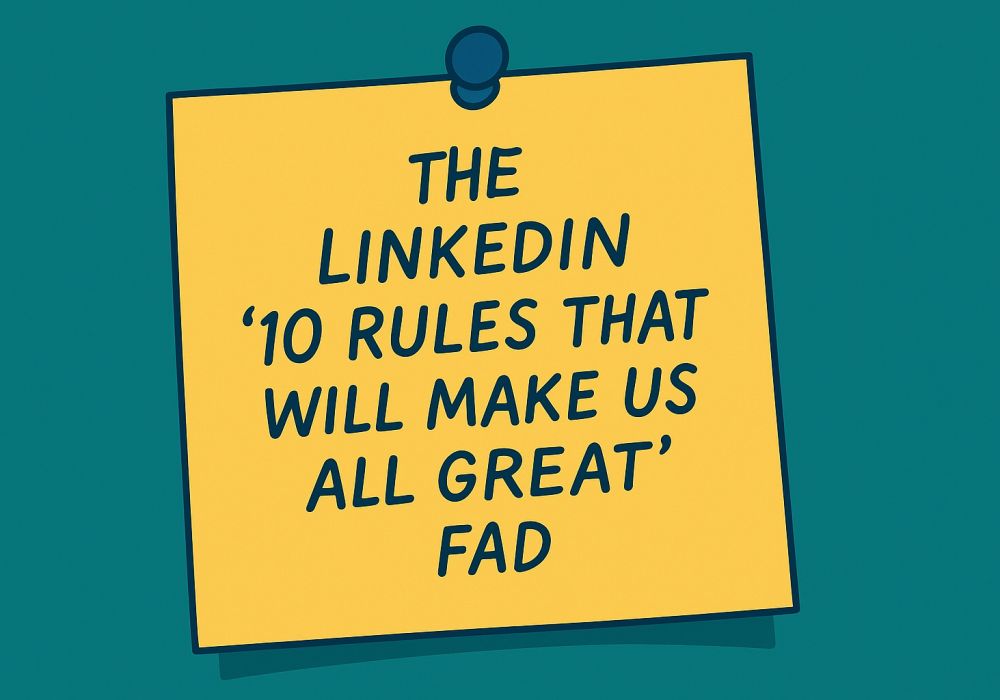The LinkedIn “10 Rules That Will Make Us All Great” Fad – Why It’s Stupid, and Why Folks Can’t Get Enough
As a psychologist, I often used to get asked to evaluate leadership training programmes — to sit at the back and stay quiet, just “evaluate.” Wow — sit back, a chance to learn so much.
So, the trainer begins in the time-honoured (but badly flawed) way: asking the class who the great leaders are. Usual answers come back — Winston Churchill, Richard Branson — the trainer writes them on the board. Next: “What makes them great?” Lots of buzzwords flying around, all recorded. Then: “How can we be like them?” And the good news? We can’t — and nor should we want to.
When I used to teach psychology to senior execs from all over the world at the Business Schools in Stockholm and Brussels, they came razor-sharp and keen to learn “the way.” They wanted the silver bullet — the leadership ‘template’ that would make them great. “Do I take the red pill or the blue pill?”
It’s like those LinkedIn ‘gurus’ who come up with the 6 rules, 10 rules, 12 rules of ‘success’ or ‘trust’ (trust is a process, not an event — remember the snake from The Jungle Book?). Or, get this — “living your best life.” Someone else telling us how we should live our “best lives.” Hmm. Be like them? No thanks. Perfection doesn’t exist, and I certainly wouldn’t want to listen to someone who believes they’ve got it all sewn up. And all their sentences begin with, “So…”
The Latin root of the word education is e-ducato — meaning “leading out.” So rather than trying to be like someone else (including Churchill and Branson), or stuffing our heads with other people’s views, why not focus on bringing out the best leader, colleague, or person that we can be — in a way that’s right, and authentic, for us?
Someone reads this and they’re like, “Ah yes, Harvard Business Review says it’s all about authenticity now.” (Last month it was all about being “humble.”) And there are pages and pages explaining how to be authentic. Except — paradoxically — they’re teaching us how to fake authenticity. How to make eye contact, smile, nod occasionally, say “uh-huh,” and look like we’re interested.
Emotional Intelligence (EQ) was the big thing in 1995, then came SQ — “Spiritual Intelligence,” of all things. And now there are EQ assessments, most with little scientific basis, lacking in validity and reliability. In fact, new research suggests that people with self-serving motives may use EQ to manipulate others.
It’s like Covey’s Seven Habits of Highly Effective People — filtering everyone through the same seven habits. But we’re all different. I do like the idea of habits — behaviours that have been instilled so deeply they become embedded, instinctual… habitual. Whatever sort of evening you’ve had, however late it is, however tired you are — you still brush your teeth, don’t you? That’s an embedded behaviour that’s become a habit.
But for me, it’s about developing the kinds of habits that help you be better — not becoming some version of Dr Covey.
Leadership development has become an industry — from expensive courses to the LinkedIn lists. Often they’re styled like little notebooks in a handwriting font, to make it look like something special, something secret, just for us. Like “the code.” I wish it existed — but it doesn’t.
The key is already inside each of us: developing enough self-awareness to know our strengths and weaknesses, and then choosing which behaviours we want to change. We can’t change our personalities — but we can modify our behaviour, if we choose to. Once we understand the impact we have (how we leave people feeling), and the consequences (what they choose to do about that impact), we have options.
For example: you ask someone to work on Saturday. They do. You forget to thank them. What’s the consequence?
Exactly.
The earliest known use of the word individual comes from The Foundation of St Bartholomew, written in 1425. It pretty much sums it up for me: in-dividuus — not divisible. A whole person.
So, no silver bullet. No quick fix. And anyway, do you really want to be like him or her?
No, I didn’t think so.
Sure, we exist in teams and relationships. But people — like organisations — are simultaneously “like some other people,” “like all other people,” and most importantly, “like no other people.” We all have our little quirks and idiosyncrasies — and that’s brilliant. It’s what makes us us.
So my advice? Learn to do things in a way that works for you. Leadership is a people game. A contact sport. Yes, you need to get close to your team — but if you're more cool or introverted, do it your way. Don’t put on the false nose and bow tie. Be you. Take an interest. Understand. Listen. That will help you see how to best modify your behaviour, through better understanding your impact.
Alternatively, you could attend a ‘Listening Skills’ course — to learn how to pretend to listen. But in my view, listening is a choice, not a technique. If you truly want to understand, you will listen. Unlike those LinkedIn lists that tell you they “employ active listening mode.” Listening is about helping the other person feel listened to — not performing a checklist of “listening skills.”
Bill McAneny is an Organisational Psychologist and creator of the first AI-Psychology coaching platform MyTeamBuilder, designed to help you become the leader you want to be — and your team the best it can be.
Curious to see how MyTeamBuilder works? You’re just a few clicks away from exploring it for yourself.
Get instant access to our private demo system—no setup required. You’ll be able to explore all the features, try the AI Coach, and see how it can support managers and teams in real time.
